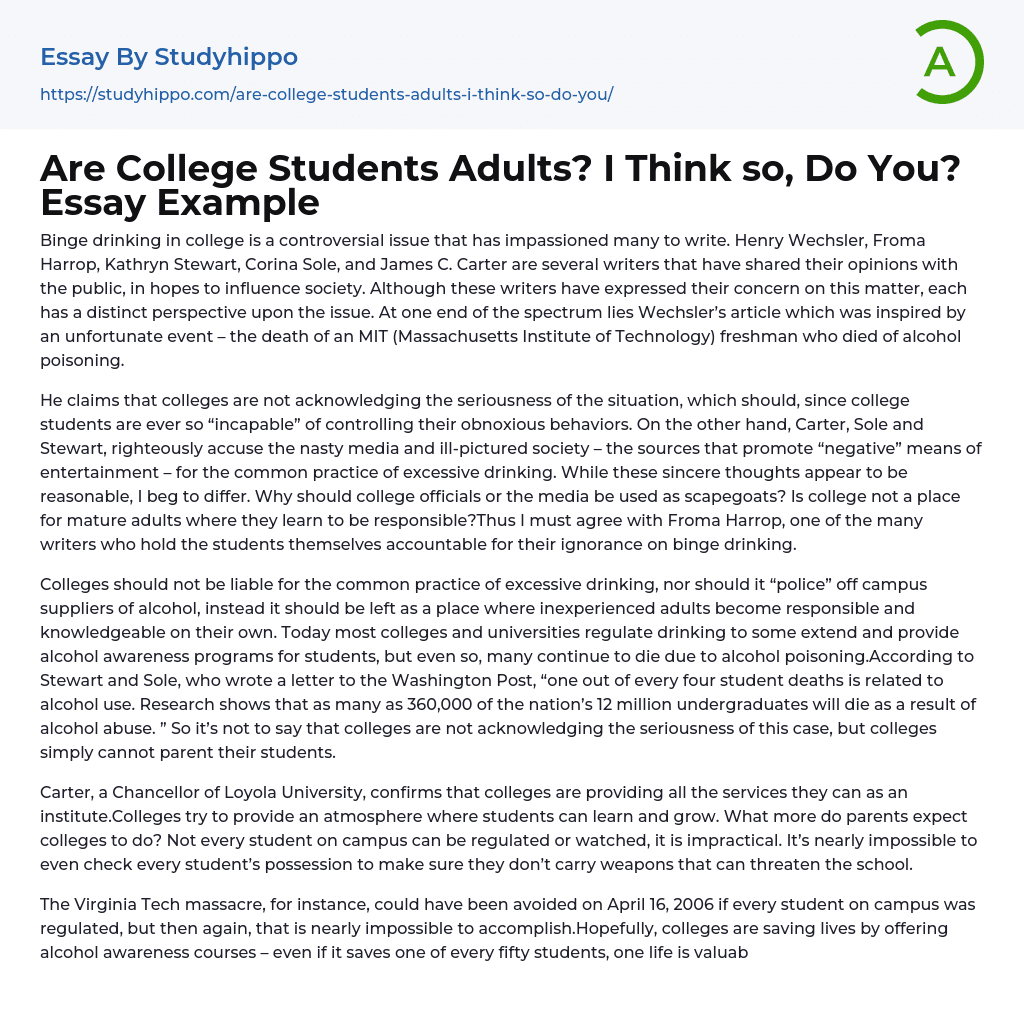

Are College Students Adults? I Think so, Do You? Essay Example
There has been much debate surrounding the issue of binge drinking among college students, inspiring a variety of passionate perspectives from authors including Henry Wechsler, Froma Harrop, Kathryn Stewart, Corina Sole, and James C. Carter. While these writers share concerns about the topic at hand, each brings their own unique viewpoint to the conversation. For instance, Wechsler's article was written in response to a tragic event - the death of an MIT freshman due to alcohol poisoning.
Although Carter, Sole, and Stewart place responsibility on the media and society for promoting negative forms of entertainment that encourage excessive drinking, he argues that colleges are not taking the problem seriously enough. He believes college students often cannot control their obnoxious behavior. However, rather than blaming college officials or the media as scapegoats, shouldn't college be a place where young adults ca
...n learn to be responsible? Froma Harrop's stance holds students themselves accountable for their lack of knowledge regarding binge drinking and is therefore supported.
Colleges ought not to be held responsible for the excessive consumption of alcohol, nor should they enforce regulations on alcohol vendors off campus. Instead, they should serve as a learning environment where inexperienced young adults can attain responsible and informed decision-making skills. Although most colleges and universities do regulate alcohol consumption and provide education on alcohol awareness, many still succumb to death by alcohol poisoning. According to Stewart and Sole's letter to the Washington Post, one in four student fatalities is linked to alcohol abuse. Research further shows that about 360,000 out of the nation's 12 million undergraduates will die due to excessive alcohol consumption. It is not that colleges are unaware of th
severity of this issue but rather college campuses cannot act as a substitute for parental responsibility.
Carter, a Chancellor at Loyola University, states that colleges strive to offer institutional services with the aim of fostering a learning and developmental environment for students. Nonetheless, it is impractical for colleges to monitor every student on campus and search every possession to prevent the presence of potentially dangerous weapons.
While it may not be feasible to control every student on campus and prevent incidents such as the Virginia Tech massacre, providing alcohol awareness courses can still be life-saving. While colleges offer programs and services on alcohol education, they cannot prevent all alcohol-related deaths due to students' easy access to alcohol. Wechsler's "Binge Drinking Must be Stopped" article notes that even though selling alcohol to those under 21 is illegal, 86% of college students still drink it. Policing off-campus sources of alcohol does not ensure that college students will not have access to it.
As per Carter, colleges have limitations when it comes to disciplining students for off-campus behavior unless directly related to the institution's mission. Thus, keeping tabs on external suppliers is beyond their purview. Instead, universities and colleges should prioritize teaching since they are centers of education. The legal system should handle the consequences of breaking laws. Despite inadequate policy enforcement monitoring at times, this is a crucial aspect of college life where pupils learn responsibility while transitioning into adulthood. Therefore, colleges shouldn't face scrutiny regarding this issue as most students enroll at eighteen years old which legally consider an adult in America.
It is important for colleges to refrain from treating adult students similarly to high school administrators treating their
students, as this would hinder their growth and autonomy. It is crucial to provide learners with the opportunity to learn from mistakes without restricting anything that could be viewed as unfavorable. College students are mature individuals who must take accountability for their behavior, such as deciding whether or not they consume alcohol. While colleges have implemented measures to prevent excessive alcohol consumption, parental upbringing and guidance remain essential in fostering responsible decision-making among students.
It is important for parents to teach their children responsible drinking habits in order to prevent disruptions in college environments. Parents should take responsibility for their children's binge drinking rather than expecting colleges to prevent excessive alcohol consumption among students. College students are adults and must be accountable for their own actions, including irresponsible drinking. If they continue to behave recklessly, the age of legal adulthood may need to be raised beyond eighteen.
Colleges and universities are implementing programs and services to reduce alcohol-related deaths among students. While it's not feasible for instructors to monitor each student on campus due to their adult rights, institutions are taking steps to address the issue. It's important to recognize that college students have decision-making autonomy.
- Child essays
- Child labor essays
- Childcare essays
- Classroom essays
- College essays
- E-Learning essays
- Elementary School essays
- Examination essays
- Graduate School essays
- High School essays
- History Of Education essays
- Homeschooling essays
- Kindergarten essays
- Middle School essays
- Public School essays
- School essays
- Single Sex Schools essays
- Special Education essays
- Student essays
- Teacher essays
- University essays
- Vocational Education essays



